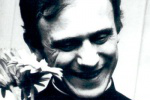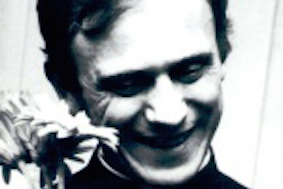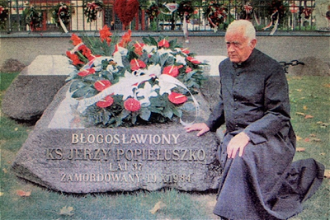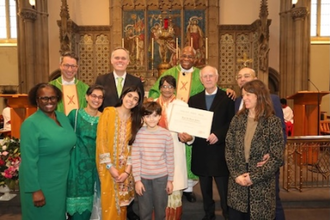In You Lord, I have put my trust - friend recalls Bl Jerzy Popieluszko
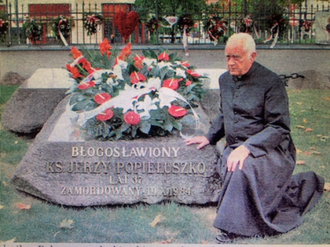
Canon Banaszkiewicz at grave of Bl Jerzy Popieluszko
Today is the feastday of Bl Jerzy Popieluszko, the young Polish priest and chaplain to workers in the Solidarity trade union, who was killed by communist government agents on 19 October 1984. His friend, Canon Czeslaw Banaszkiewicz, spoke about his life in an interview with Lukasz Krzysztofka, Przewodnik Katolicki.
When and where did you meet Father Jerzy for the very first time ?
I met him in 1978. He was appointed vicar and moved into the same parish of the Infant Jesus in Warsaw as me. He was my neighbour and became my friend; we were almost like brothers for six years until the end of his life.
What sort of impression did he make on you ?
He was of small stature, slim, young, having been in the priesthood for six years. His first parish had been Zabki near Warsaw, the second our Lady Queen of Poland in Anin. From there he came to Zoliborz where we worked together for a year. We ate at one table and said Mass at one altar. I was amazed and surprised by his attitude. He was a really devout priest, a true priest of Christ. I think the statement that he put on his First Mass picture: "God is sending me to spread the Gospel and heal the wounds of hearts in pain," this was his life's mission which he fulfilled from the beginning of his priesthood. He lived with the consciousness that he had been sent by God to spread the Gospel. His presence at Zoliborz during the first four years was solely to spread the Gospel and heal the wounds of hearts in pain.
At the end of 1980 Father Popieluszko moved to the parish of St Stanislaw Kostka where the parish priest was Father Teofil Bogucki.
When Father Jerzy left the parish of the Infant Jesus the Archdiocese named him the priest for the Health Service. He moved into an attic next to St Ann's Church, his own 'dovecote'. There was a tiny window in the roof through which you could look onto the roofs of the Marienstadt. Father Jerzy's room was accessed by a little metal ladder. I had known Father Bogucki for many years. I had been the vicar at the parishes of St Stanislaw Kostka and of the Baby Jesus during the time that Father Bogucki had been dean for Zoliborz. I proposed to the prelate that he invite Father Jerzy to the presbytery. He answered: Then come. I told Jerzy and we went together. Father Bogucki spread out his hands as a gesture of greeting and said: "Father, here are your living quarters and the lower Church is where Father can welcome the Health Service and students." Father Bogucki gave Father Jerzy a warm welcome. It was surely God's grace that allowed him to become Father Jerzy's spiritual father.
On 31st of August Father Jerzy prepared Mass for the workers of the Warsaw "Huta". How was he welcomed there ?
It was extraordinary, in August 1980 there were strikes on the coast, in the Warsaw 'Huta' which had a workforce of ten thousand there was a sit-down strike. The workers were gathered together locked inside their place of work. They sent a delegation to the Primate that they were looking for a priest to say Sunday Mass for them. Father Piasecki, secretary to Cardinal Wyszynski, Primate of Poland, came to us to request that one of our priest could go to them and say Mass. None of the priests could go and then Father Jerzy said that maybe he would be able to. He took with him a suitcase containing the liturgical receptacles and went. He was allowed entry to the 'Huta' and was greeted by applause. He turned around to see if there was someone important behind him. Later he commented that the applause was for the Church which after 40 years had come to say Mass amongst the factory workers. He heard Confessions however he could, sitting on boxes even arms materials, and then he distributed Communion.
In February 1982 Fr Popieluszko begun celebrating monthly Masses at St Stanislaw Kostka Church for the intention of the Motherland.
Who came to these Masses and what did Father Jerzy say during them?
The initiator of these Masses was Fr Bogucki. The late Fr Syryjczyk used to celebrate them, after him Fr Jerzy. He used to prepare for them very carefully throughout the whole month. Each Mass for the Motherland had its own particular intention ( for the youth, miners, factory workers, teachers). Fr Jerzy chose appropriate liturgical readings. Everything was according to the Church's social teaching. People from all parts of Poland came, crowds of them. The Church was so full that some had to stand outside or even in the park nearby. Father Jerzy used to print out the homily before the Mass and hand it to his congregation so that they could take copies back to their communities. He said: "I spread the Gospel, the teachings of the Primate of the Millenium, the Holy Father John Paul II, my sermons were not directed against anybody, only against wrongs, lies and injustice and in defence of human dignity. He simply stated the truth that people were thirsting for."
In spite of all the difficulties that the authorities created, the Masses for the Motherland were always full. People were hungry for the truth, Christ, the Gospel, for they wanted to be authentic children of God.
How did Father Jerzy gain authority amongst the workers ?
Firstly, by his bravery, his priestly devotion and his faith. These were the foundations of his personality. He was a priest who authentically firmly believed, was brave, honest, dedicated, open, who wanted to share his heart and everything with every person without exception - believer or nonbeliever, he was a brother to every person.
In this midst of this accumulation of responsibilities and serving others did Fr Popieluszko have time for prayer ?
I was Fr Jerzy's confessor. When he asked me to be I was surprised as I was his friend and neighbour. We would walk around the Church and he make his confession. This shows that he was a humble priest, deeply believing, an authentic priest of Christ. That is why he would not part from his rosary or breviary, everywhere where possible he organised places to celebrate Holy Mass. He greatly venerated the Mother of God. During his last reflection on the 19th October 1984 in Bydgoszcz he said: "Mary, Mother of Poland. Our Hope. Sorrowful Queen of Poland. In our rosary prayer we stand before you, we people of work and the oasis of the home Church. We want to be with your Son during the hours of His agony, to look at His maltreated face, we want to take up our cross, the cross of our daily work, our toil, our problems and to go the way of Christ on Calvary". This confirms his devotion to the Mother of God. On the 12th anniversary of his ordination he went to Jasna Gora, to give thanks for the gift of priesthood. " With thanks for the gift of priesthood, with a petition for the gifts of the Holy Spirit".
Did Father Jerzy expect that he might be murdered?
From the time that he started celebrating the Masses for the Motherland, he was aware that he could be killed. He would reply: I am ready for anything. A month before his death when there was a massive surveillance of Fr Jerzy, the factory workers wanted to protect him but he said: "Through death and a funeral one can achieve more than when while living." He also said: "Resurrection is through the Cross, there is no other way."
From where did Father Popieluszko draw the strength to defend human dignity?
Faith, his inner life and his calling were the components which gave him the strength to serve others. He often went to retreats, he was a man of prayer, from these came his power and strength.
On the 14th June 1987 the grave of Fr Jerzy and the church of St Stanislaw Kostka were visited by Pope John Paul II.
Fr Jerzy never met John Paul II personally. The Pope supported him with his heart and prayer. On the 14th June 1987 the Pope after a long prayer came out of the church without any speeches. I was very close, he went through the stone rosary which surrounds the tomb, went up and kissed the gravestone. He knelt a long time keeping the palms of his hands resting on Fr Jerzy's grave. Then he got up, blessed the tomb and kissed it again. I think that this was a great meeting of two saints, John Paul II and Fr Jerzy.
Father, do you feel the presence and protection of Fr Jerzy?
Yes, personally, I feel his help daily. God is giving me health and strength to bear witness to Fr Jerzy.
Father, which sentence from his homilies is the most important to you?
Especially important I think is the last sentence from his reflections in Bydgoszcz: Let us pray that we may be free from fear, intimidation but most of all from the lust for revenge and violence.
What would Blessed Father Popieluszko be talking about today at the Masses for Poland?
Today Poland and the World need Father Popieluszko. He would be saying the same as what he was saying 30 years ago. If people took his homilies into their hands and thought about them they would see that everything has a relevance to the present day. Today the social and political situation is more complicated and difficult than then but his teaching still remains relevant.
In how many places and where are the relics of the blessed priest of Solidarity?
In the whole world there are about one and a half thousand of his relics, on all the continents. I will here mention the Philippines, Brazil, Italy - here surely the most, then further: Germany, Spain, France, Austria, Slovakia, Czech Republic - the whole of Europe. More and more pilgrims are coming to the grave of Blessed Fr Jerzy. People are receiving many graces and physical and spiritual miracles with his intercession. It is difficult to foresee when we can expect a canonization but our prayer is definitely required for this intention.
(The article was first published on ICN last year, but we are reprinting today because there have been so many requests for it.)
See also: ICN - Poland: Fr Jerzy Popieluszko is beatified www.indcatholicnews.com/news/16268



